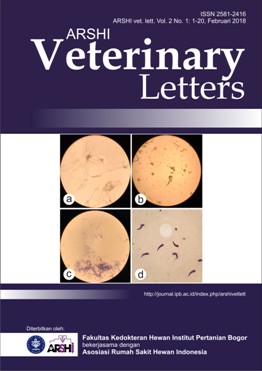Infeksi protozoa berflagela pada kura-kura indian star
Abstract
Protozoa biasa ditemukan pada saluran pencernaan hewan reptil. Jumlah protozoa yang tinggi dapat menimbulkan masalah kesehatan pada hewan reptil seperti kura-kura. Pasien jenis kura-kura jantan dengan ras indian star datang dengan keluahan menurunnya nafsu makan serta feses yang encer dan berwarna putih. Penetapan diagnosa diperoleh dari hasil pemeriksaan fisik dan pemeriksaan laboratorium. Pemeriksaan laboratorium yang dilakukan meliputi pengamatan pada sampel feses secara natif, pengapungan dengan larutan gula jenuh serta pewarnaan sampel feses. Hasil pemeriksaan laboratorium menunjukkan bahwa kura-kura terinfeksi protozoa berflagela. Berdasarkan morfologi protozoa yang diamati, diduga termasuk ke dalam genus trichomonad. Namun perlu pemeriksaan lebih lanjut untuk memastikan jenis protozoa, karena sulit bila hanya berdasarkan pemeriksaan morfologi secara sekilas.Downloads
References
Issa R. 2014. Non-pathogenic protozoa (review article). International Journal of Pharmacy and Pharmaceutical Sciences. 6(3): 30-40.
Scullion FT, Scullion MG. 2009. Gastrointestinal protozoal disease in reptiles. Journal of Exotic Pet Medicine. 18(4): 266 – 278.
Wilkinson R. 2004. Clinical pathology. Di dalam: Medicine and Surgery of Tortoises and Turtles. McArthur S, Wilkinson R, Meyer J. (Eds). Blackwell : Oxford.
Copyright (c) 2018 CC-BY-SA

This work is licensed under a Creative Commons Attribution-ShareAlike 4.0 International License.
Authors who publish with this journal agree to the following terms:
1. Authors retain copyright and grant the journal right of first publication with the work simultaneously licensed under a Creative Commons Attribution License that allows others to share the work with an acknowledgement of the work's authorship and initial publication in this journal.
2. Authors are able to enter into separate, additional contractual arrangements for the non-exclusive distribution of the journal's published version of the work (e.g., post it to an institutional repository or publish it in a book), with an acknowledgement of its initial publication in this journal.
3. Authors are permitted and encouraged to post their work online (e.g., in institutional repositories or on their website) prior to and during the submission process, as it can lead to productive exchanges, as well as earlier and greater citation of published work (See The Effect of Open Access).


.jpg)















